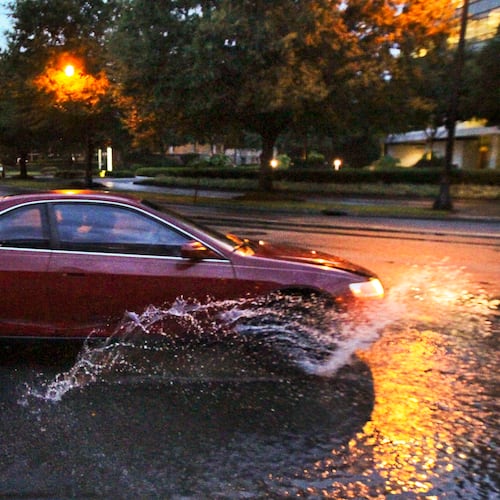When the U.S. Army Corps of Engineers opened dam gates at Buford Dam on Wednesday afternoon, water recreation businesses put away their kayaks and deflated their inner tubes.
Because Lake Lanier’s waters have risen above its full pool elevation of 1,071 feet, the excess water must be released into the Chattahoochee, making the river that snakes through Gwinnett, Cobb and Fulton counties too fast for boaters and swimmers. There's also the possibility of rising bacteria levels in the river from the influx of water, the agency said.
Lake Lanier, the Army Corps, says, is still safe for normal recreation.
READ | Officials: 'Unsafe' to boat, swim in Chattahoochee; Lake Lanier safe
The agency plans to release the water into the river 24 hours a day until June 13. The river is expected to flow at rates of 6,000 cubic feet per second or higher — unsafe for any inner tube, raft or non-motorized boat, said Barbara Russell, general manager of Roswell tubing and boating company Shoot the Hooch.
At half the predicted flow rate, multiple river recreation companies would stop allowing customers to go tubing. At two-thirds, Russell would no longer allow kayaks or canoes to go out.
“It’s not worth taking a chance,” she said. “That river is cookin’, it’s going so fast.”
Water coming from the dam changes the river "from tranquil to treacherous at best," said Capt. Tommy Rutledge, spokesman for Gwinnett's Fire and Emergency Services department, which performs swift-water rescues from the Chattahoochee.
"The conditions could easily cause a boat or kayak to capsize," he said. "Anyone in the river could be swept away by the fast-moving water and may not be strong enough to fight the current to make it to shore.”
Shoot the Hooch is one of multiple river recreation companies in metro Atlanta that have had to temporarily shut down at the start of their peak season due to the two-week dam release. It’s simply not safe enough to allow people on the water, so there’s no point in opening, said Jeff McCullough, co-owner of River Tubing in Duluth.
“If someone were to get hurt, that would be more devastating than any money we could lose,” McCullough said.
Water recreation businesses typically reach their busiest points around July and August, he said, so a drop in early June is not as painful as it would be in late summer. But the two-week closure still cuts into businesses’ profits.
“It’s not a good thing. I wish they had caught this earlier,” said Bubba Sloan, who operates High Country Paddle Shack. “But Mother nature has a way of doing things and we have to find a way to live with it.”
That means keeping employees working while water activities are on hold. Sloan has shifted his employees to the company’s retail locations or to maintenance duty. Russell has also put many of her Shoot the Hooch employees on maintenance projects.
“They’re depending on this job to earn money for school and pay rent, "Russell said, " ... It’s hard. I’m trying to make some work time for the staff."
Like AJC on Facebook | Follow us on Twitter
About the Author
Keep Reading
The Latest
Featured
